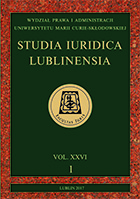Regulacja prawna żywności genetycznie zmodyfikowanej w USA i UE w kontekście planowanego Transatlantyckiego Porozumienia Handlowo-Inwestycyjnego (TTIP)
Legal Regulation of Genetically Modified Food in the United States and the EU in the Context of the Proposed Transatlantic Trade and Investment Agreement (TTIP)
Author(s): Paweł Wojciechowski, Małgorzata KorzyckaSubject(s): Agriculture, International relations/trade, EU-Approach / EU-Accession / EU-Development, Globalization
Published by: Wydawnictwo Naukowe Uniwersytetu Marii Curie-Sklodowskiej
Keywords: globalization; bioengineered foods; genetically modified food; GMO free;
Summary/Abstract: The process of globalization in the production and distribution of food, ongoing for many years, causes a number of problems. Agreement on the Transatlantic Trade and Investment Partnership (TTIP), negotiated since 2013 by the US and the EU, is one of the instruments to manage of globalization process. The Agreement is aimed at liberalization of trade of goods and services. This article presents the US and the EU regulation on genetically modified food and assessment of the consequences of TTIP Agreement for the regulation of GM food in the EU. The analysis leads to the conclusion that the approach to genetically modified food in the legal regulations of the EU and the US vary significantly. In the US, it was assumed that GM food is not different from conventional food and, consequently, the consumer does not need to be informed on GM food contents. In opposition to the US approach the EU law separately regulates GM food and gives the consumer the ability to make choice of food which differs only by the usage of genetic engineering. Authors conclude, that the signing of TTIP and the full opening of the EU market for food from the US may result in loss of supervision over genetically modified food by EU public authorities as well as the collapse of the EU model of consumer protection based on the precautionary principle.
Journal: Studia Iuridica Lublinensia
- Issue Year: 26/2017
- Issue No: 1
- Page Range: 465-488
- Page Count: 24
- Language: Polish

